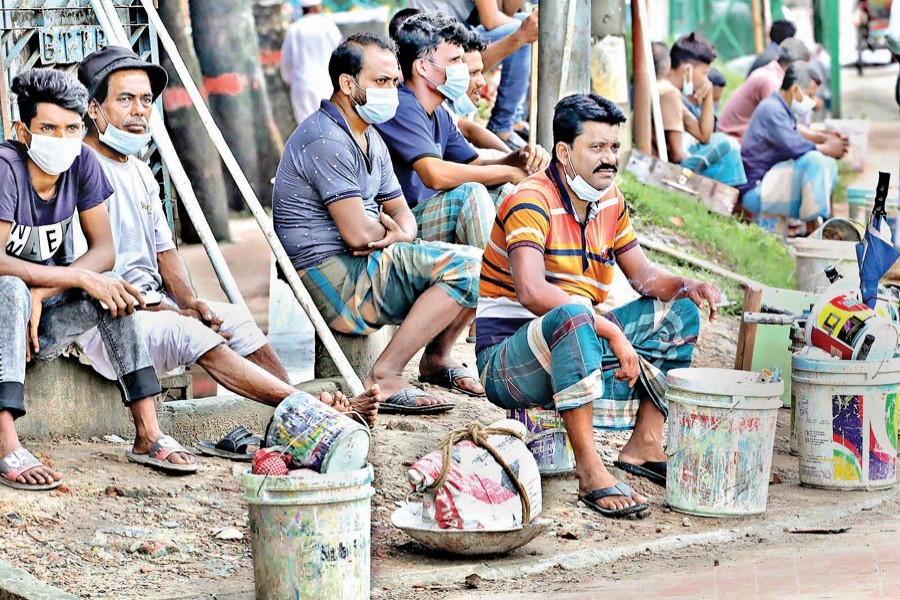The ongoing strict lockdown imposed to stem the spread of coronavirus is dealing a severe blow to the low-income people, especially those in the informal sector.
In fact, the restrictions on movement of people, transportations and businesses are not only affecting their livelihoods but also pushing them back to poverty again.
Given the prevailing situation, many lower and marginal segments of people are compelled to borrow money from friends, relatives and NGOs as their savings are finished or about to finish.
Some of them have even changed their occupations as a surviving strategy alongside slashing down expenses on foods and other areas.
Abul Hossain, who owns a small shop that primarily sells tea, cigarette, battle leaf, bakery items and soaps in the Khilgaon Taltola area, told the FE that he had opened the shop despite the restrictions, as his family was completely dependent on the earnings of the shop.
He said he was caught by the police on July 26 for opening the shop defying the government restrictions and was produced before a court. He was later released on bond.
"I am still flouting the lockdown rules as I have no other option for survival. I had little savings, which we already finished during the previous lockdown days," he said.
"Recently, I took a loan from an NGO. If I keep my shop shut, who will repay it?"
Md Rojob Miah, who was a salesman at a bookstore in Nilkhet, said the owner had kept the book shop shut since April in the pandemic.
As a result, Rojob said he and some others had lost jobs there.
Seeing no hope in this highly expensive city like Dhaka, he started pulling the manually-driven three-wheeler, which has been kept out of the purview of lockdown restrictions.
"But income drops drastically due to lesser movement of people," he added.
The FE correspondent found a garage at East Rampura in the city where nearly a dozen CNG-run three wheelers were kept.
Talking to the FE, a CNG driver named Sumon Khan said he had become jobless since the lockdown resumed and was struggling to survive with his four-member family.

A few days ago, he took Tk 60,000 from his father-in-law after the savings were over.
"How long will I be able to survive with this money if the lockdown expands?" he questioned.
When asked about the government's support, he said they had heard about such support on television.
"But where is the assistance? I did not get any. I just got a packet of food on the first day of the hard lockdown. That's it," Sumon ventilated his frustration.
Md Rana Hamid, proprietor of the Jui Shoe Gallery located at the Rampura Super Market, said they had resumed business activities with a lot of hope before the second wave struck.
The ongoing spell of lockdown came at a time when traders like him made a reinvestment on loans, targeting the upcoming Eid-ul-Azha, he said.
"Now what will happen to me? And how can I meet the demands of my family and repay the instalments? Go and see the lines at OMS [Open Market Sale] points, you will probably see the real picture," he added.
President of the Bangladesh Dokan Malik Samity (BDMS) Md Helal Uddin said the lockdown came as a huge blow to the shop owners and their employees.
He said many shop operators took formal credit to resume their operations under a new business environment in January when the coronavirus situation became normal.
But the pandemic situation started to worsen from April last followed by spells of lockdown to contain the viral transmission here, he said.
"Just think about them [shop owners and employees]. How they are surviving. Many people were working in these shops and now become jobless. The lockdown will certainly increase the unemployment rate and thus poverty here," Mr Helal added.
When contacted, Center for Policy Dialogue (CPD) senior research fellow Towfiqul Islam Khan said many people had returned to their jobs in January and February last when the Covid-19 situation became almost normal.
Citing a study of the think tank, he said though their earning was then 10 to 12 per cent lesser than that of pre-pandemic time, they were recovering well.
The second wave that started spreading from April last badly impacted the recovery of the lower income and marginalised communities again and it is creating a new segment called 'new poor' in the economy, he said.
But the emergence of new poor was neglected in the just passed national budget for financial year 2021-2022, which is unfortunate, said Mr Towfiqul.
He said the government had formed a new platform named 'Call 333' to help people in need get food support by dialling 333.
"But the majority of the targeted group do not know about it due to poor publicity and the allocation was inadequate," he said.
The government should realise the plight of the new poor, especially those living in the urban areas, and urgently bring them under special social protection coverage, he said.
Mentioning CPD's previous study report, he said the affected groups had informed them that it would take 18 months to repay the loans they had taken during the pre-second wave lockdown.
"Now the latest spell of lockdown will certainly force them to take more loans. So, it will take more time to repay those," Mr Towfiqul observed.
He also suggested immediate roll-out of the credit guarantee scheme by the central bank to protect these communities.


